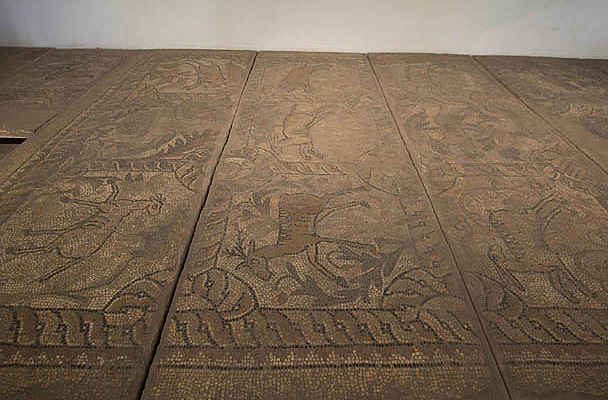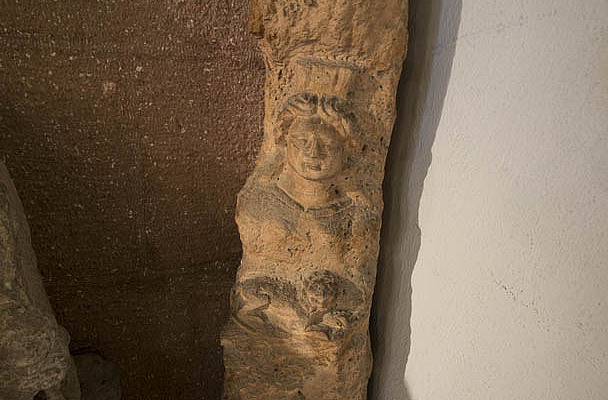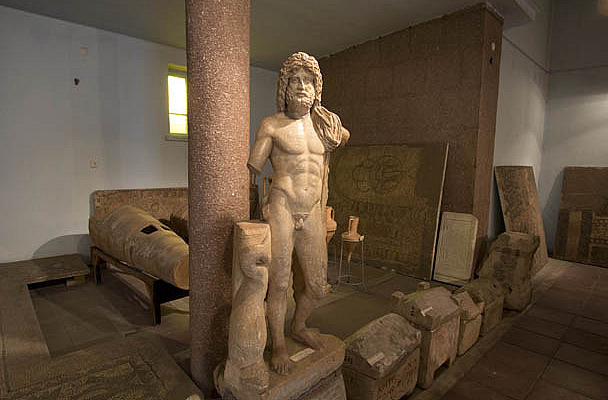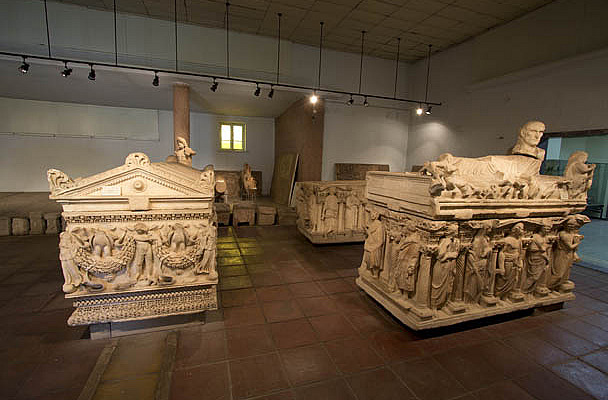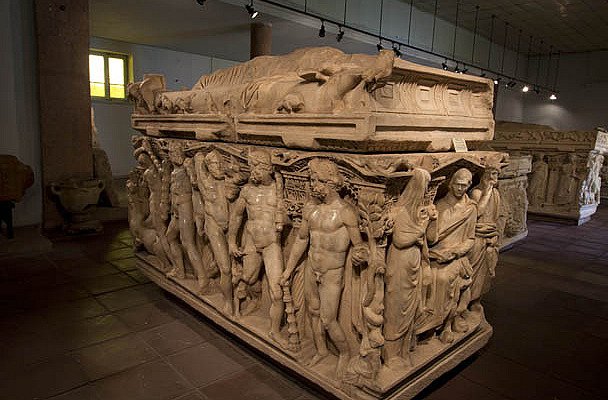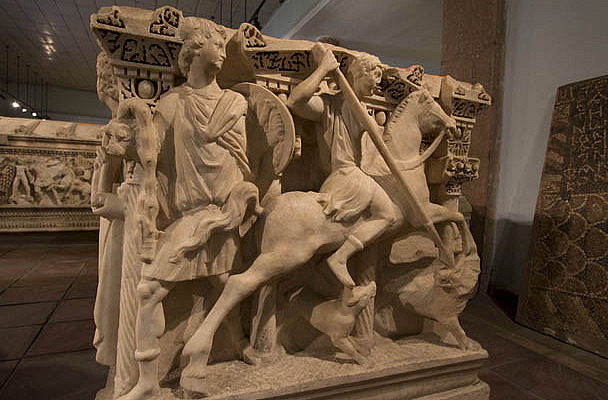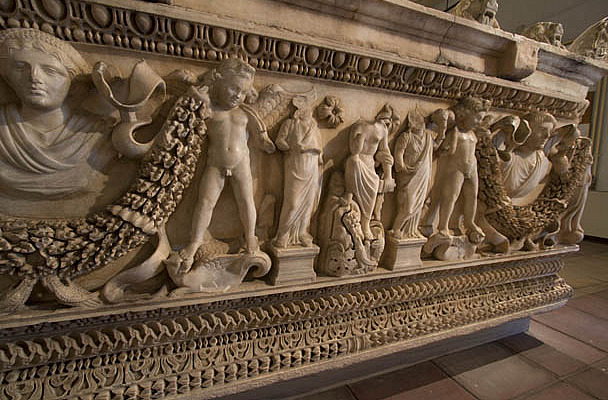Historical Background
Archaeological findings suggest that the area surrounding the city of Iconium (modern day Konya) was inhabited as early as 3rd millennium B.C. It is known that the Hittites controlled the area in ~1500 B.C. and then the Sea Peoples in ~1200 B.C. The Phrygians established a kingdom in central Anatolia in ~800 B.C. but then in ~690 B.C. Cimmerian invaders took the land but were soon displaced by the Lydians in 637-626 B.C., who occupied the area until they were conquered by the Persians in the early 6th century B.C.
The Persians ruled Anatolia until 333 B.C. when Darius III of Persia was defeated by Alexander the Great and Iconium came under Greek rule. Upon Alexander's death in 323 B.C., Iconium fell under the rule of the Seleucid Empire for awhile before being placed under Pergamene rule during the Hellenistic period. Iconium became part of the Roman Empire and part of the Roman province of Asia in 129 B.C., just four years before the Pergamene kingdom was bequeathed to Rome. Some ancient sources speak of Iconium as part of Phrygia until the Roman period (e.g. Xenophon), while other sources (e.g. Cicero, Strabo, Pliny) refer to Iconium as part of Lycaonia.
During the Roman period, Iconium was one of the chief cities in the southern part of Galatia and might have been part of the Phyrgian region as well at times. Being at a major crossroad with the King's Road and being in the middle region between the Aegean in western Asia and the Euprates in eastern Asia, Iconium was certainly an important city for commerce and military strength. The city was so important that Emperor Claudius (41-54 A.D.) bestowed the honorific title of Claud-Iconium (“Claudiconium”), which appears on coinage and inscriptions of the 1st - 2nd century A.D. This act indicated the degree to which Claudius praised the city, but Iconium did not reach colonial status until Emperor Hadrian (117-138 A.D.) decreed it a Roman colony. Hadrian renamed the city Colonia Aelia Hadriana Iconiensium in his honor.
Archaeological Significance
Modern day Iconium (Konya) is built on top of ancient Iconium and the ancient city has been either destroyed or buried beneath the modern city. Some remains from the ancient are still visible but there are just a handful. The most prominent structure is “Hadrian's Gate” which was erected in the 1st century A.D. to commemorate the emperor's visit to the city. Some of the ancient city walls are also visible. Most sections of the wall are from the Byzantine (3rd – 9th century A.D.) and the Seljuk (10th – 11th century A.D.) periods. But they are built upon Hellenistic and Roman foundations from 1st century B.C. – 1st century A.D. and some of the original stones still comprise the base of the walls.
Two inscriptions have been found at Iconium in the ancient Phrygian language that date to the 3rd century A.D. Indicating that the Phrygian language was still in use by locals throughout the Roman period. Furthermore, a recent inscription from the reign of Hadrian mentions the first duumvir (“magistrate”) who was appointed in the new Roman colony of Iconium. Throughout the Roman period, Iconium remained a Hellenistic city but maintained a strong pro-Roman position.
A collection of artifacts, statues, and inscriptions from Iconium and the surrounding area are on display in the Konya Archaeological Museum. Among the most impressive are several marble sarcophagi from the 3rd century A.D. with beautiful ornate scenes carved into the sides. The most famous is the Hercules sarcophagus (named for the scenes of Hercules carved on all four sides). But closely impressive are the several Sidamara sarcophagi (also from the 3rd century A.D.).
Biblical Significance
After they got attacked by an angry mob at Antioch of Pisidia and then run out of town, Paul and Barnabas shook of the dust of their feet (an ancient custom signifying the rejection they experienced in that city) and proceeded to the near-by city of Iconium. At Iconium, Paul and Barnabas repeated their pattern of preaching in the synagogue on the Sabbath. Luke's record in Acts describes Paul and Barnabas' preaching having such power and boldness that many Jews and many Gentiles believed the gospel message (14:1). The power in Paul's message lay not with his eloquent rhetoric or style but with the conviction with which he delivered it. People don't have to know every detail about the gospel to preach its central message with conviction or know every counter-argument to defend the gospel. And yes, the gospel NEEDS DEFENDING! Those who might say the gospel needs no defense probably have no idea how to defend it and therefore hide behind a false sense of justification for why they never feel they need to.
The power in preaching comes with: (1) the preacher's ability to transmit a confidence in the validity of the message to the audience, and (2) the reasons for its validity. Paul had both, and Paul delivered both. As a result many Jews and Gentiles were persuaded to believe in the gospel and come to saving faith at Iconium.
But, like at Pisidia Antioch, some disgruntled Jews harbored disdain toward Paul and the gospel message and felt their threat on their religion and so spoke evil of Paul and the gospel among the people and poisoned their minds against him and Barnabas. Despite the challenges presented by the opposing Jews, Paul and Barnabas paid no mind to them but just continued preaching boldly about the grace of the Lord and about salvation through Messiah. In addition to Paul's masterful preaching style and defense of the gospel amidst the onslaught from the Jews, the Lord provided validity for the message of the gospel by giving Paul and Barnabas the power to perform signs and wonders among the people. However, after preaching for some time at Iconium, the town people were divided between the apostles and the Jews (14:2-5). Some people believed the gospel that Paul preached, while others were convinced by the Jews to reject the gospel.
Even if the Jews were speaking evil of Paul and Barnabas, they did not let their antagonism deter them from pursuing the objective of their mission. Regardless of what the enemy was attempting Paul and Barnabas continued to preach the gospel. Surely Paul and Barnabas knew that the Jews would persist and find ways to infiltrate the minds of the people and subvert them to their side. Paul and Barnabas simply left that up to the Lord and continued to speak out and announce the good news for all to hear.
We cannot control the circumstances we find ourselves in when preaching, but we can control whether we let it influence our mission. Some people want perfect circumstances to speak about the good news, but that rarely, if ever, is reality. So many influences are attempting to capture people's interest and divert them from hearing the gospel. The world, the adversary, our flesh, and many other things are constantly vying for our attention and devotion. It would be an understatement to say that distractions abound in this life. Some of these conflicting interests are not evil in and of themselves, but the ones that are directed at actively decreasing our embrace of the gospel are absolutely evil.
Just like at Antioch of Pisidia, a group leaders of the Jews and Gentiles riled up the people of Iconium and got a mob together to attack and stone Paul and Barnabas. Instead of being caught in it like in Antioch, the apostles learned of it before the Jews got a hold of them and they decided to depart from the city and retreat to the cities of Lystra and Derbe in the region of Lycaonia (14:5-6).
A community of believers began to grow in Iconium and it is likely that the believers in Iconium frequented the churches in the region of Lycaonia (such as Lystra and Derbe). Gauis, a devout believer, and a disciple, who would journey with Paul later during his third missionary tour, was commended by the believers of Lystra and Iconium (Acts 16:2). Thus, the churches must have intermingled or Gaius traveled to Iconium on several occasions to be well known enough for the Iconium church to endorse his character and integrity.
Also, Paul mentions the series of abuse and persecution that he and Barnabas endured at Antioch of Pisidia and Iconium, and eventually in Lystra. In his second letter to Timothy, Paul writes, “You know how much persecution and suffering I have endured. You know all about how I was persecuted in Antioch, Iconium, and Lystra – but the Lord rescued me from all of it” (3:11). Paul and Barnabas were run out of the city by a frenzied mob in Antioch of Pisidia, evaded a planned attack to stone them when the plot was exposed to the disciples at Iconium, and then in Lystra, Paul was stoned to the point of death (or stoned completely to death) but recovered and was able to regroup with the believers that night. In each circumstance, which got progressively worse, the Lord strengthened Paul and Barnabas to endure the pain and suffering and continued to deliver them even when circumstances proceeded to worsen. The Lord's deliverance was not to remove the experiences (because that obviously did not happened at Lystra) but to help them make it through the suffering.
God's deliverance does not always consist of taking away problems and making our lives easy. The Lord never promised that the good news would put us on an easy and safe road to travel. He just promised those who would choose to take would undoubtedly make it to the end.







